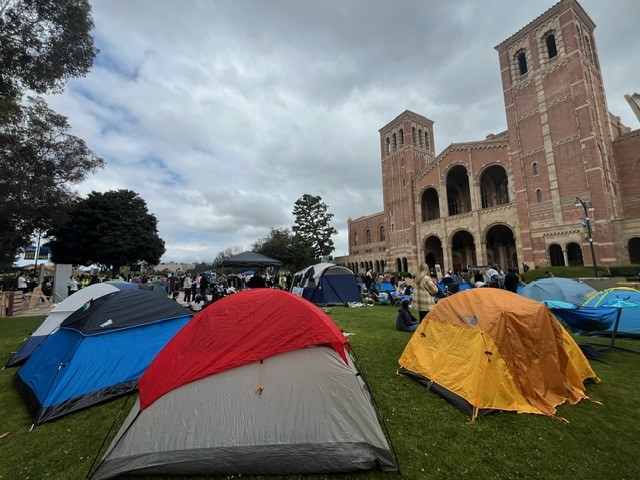Chinatown’s classic mom-and-pop stores could be in jeopardy if Walmart opens a market on the edge of the historic district, community advocates said Monday.
The retail giant’s announcement Saturday that it will open a 33,000-square-foot grocery store at the northwest corner of Cesar Chavez and Grand avenues has advocacy groups and community organizers gearing up for a fight.
Local organizations like the Southeast Asian Community Alliance were blindsided by the announcement, and are “looking into options to prevent this from happening,” said SEACA Executive Director Sissy Trinh.
The new location will be about one-fifth the size of a typical Walmart, allowing the retailer to sidestep the LA superstore ordinance passed in 2004, which allowed the city to review implications like job quality and potential neighborhood business loss before approving stores larger than 100,000 square feet.
The proposed Walmart would be housed in a facility built with public funds allocated by the California Redevelopment Agency and mandated to provide permanent, quality jobs for low-income residents.
“Public dollars were used to build the building and it should have a public benefit,” said Trinh.
Instead, Trinh worries a Walmart will hurt locally owned businesses and the area’s “strong cultural identity.”
Local
Get Los Angeles's latest local news on crime, entertainment, weather, schools, COVID, cost of living and more. Here's your go-to source for today's LA news.
Community advocacy groups see Walmart’s relations with employees as its biggest flaw.
“Our main concern is maintaining a high standard of jobs,” said Aiha Nguyen, senior policy analyst for the Los Angeles Alliance for a New Economy’s Good Grocery Stores campaign. “Walmart brings poverty-level jobs and help employees to apply for Welfare, and even, ironically enough, food stamps.”
“We end up choosing between food, bills, and health insurance,” said Baldwin Hills Crenshaw Plaza Walmart Department Manager Girshriela Green in a LAANE news release. Green makes $9.80 an hour.
Calls to Walmart were not immediately returned, although in an interview with the Los Angeles Times, company spokesman Steven Restivo defended the retailer, saying the company pays an average hourly wage of $12.69 to full-time California workers and gives employees access to healthcare.
Jenny Schuetz, an assistant professor with the USC Price School of Public Policy who researches urban economics, argues that Walmart’s labor policies may not be as bad as some suggest.
“Walmart gets put under fire for their labor practices, but from an economist’s standpoint, the fact that they can hire workers means it’s a better alternative,” Schuetz said, adding that many small businesses like Chinatown’s mom-and-pop shops often can’t afford to offer health care packages.
Though Walmart has faced a torrent of lawsuits regarding its workforce, Schuetz notes that Walmart’s bad reputation could be due in part to a PR problem.
“Walmart has run into similar opposition in other urban areas where they’ve tried to open stores, whereas their competitor Target has been welcomed with open arms,” Schuetz said, mentioning the Target expected to open downtown this year at 7th street and Figueroa.
The competitors in reality are very similar, Shuetz said, but “Walmart for some reason is the bad guy.”
A Walmart Supplier Diversity Summit has been scheduled for March 15 to give local suppliers an opportunity to meet with Walmart and discuss business opportunities, said Nicki Ung, executive director at the Chinese Chamber of Commerce of Los Angeles.
Though the chamber is a non-partisan group and will not take an official stance on the issue, it believes opening a Walmart would provide an opportunity to bring more visitors to Chinatown, and it would give local Chinatown residents a different grocery option, Ung said.
But groups like SEACA aren’t arguing that grocery stores or even large corporations are completely unwanted in an area like Chinatown; it’s Walmart’s specific reputation for unfair employment and edging local businesses that worries Trinh.
“We wouldn’t be against Walmart if they didn’t have such a bad track record,” Trinh said.
From a consumer standpoint though, Walmart’s economic success indicates that a superstore may be what consumers want, Scheutz said.
“When Walmarts move into an area and do well, it implies that they’re filling a niche that wasn’t there,” Schuetz said.
For now, organizations like SEACA and LAANE are looking to mobilize the community and put pressure on elected officials while continuing to gather information.
At this early stage, councilmembers are making sure Walmart has the needed permits to move into the space, which is what they would typically do for any business coming in, said council spokesperson Tony Perez.
Because of the neighborhood’s high number of Chinese, Vietnamese, Cambodian and Mexican immigrants and refugees, many of the staple foods found in locally owned stores can’t be found at run-of-the-mill supermarkets.
If Walmart were to put many of these shops out of business as it has in other cities, Chinatown could lose some of its signature flavor, Trinh said.
“It would be like any other neighborhood,” Trinh said. “Not Chinatown.”
Follow NBCLA for the latest LA news, events and entertainment: Twitter: @NBCLA // Facebook: NBCLA



